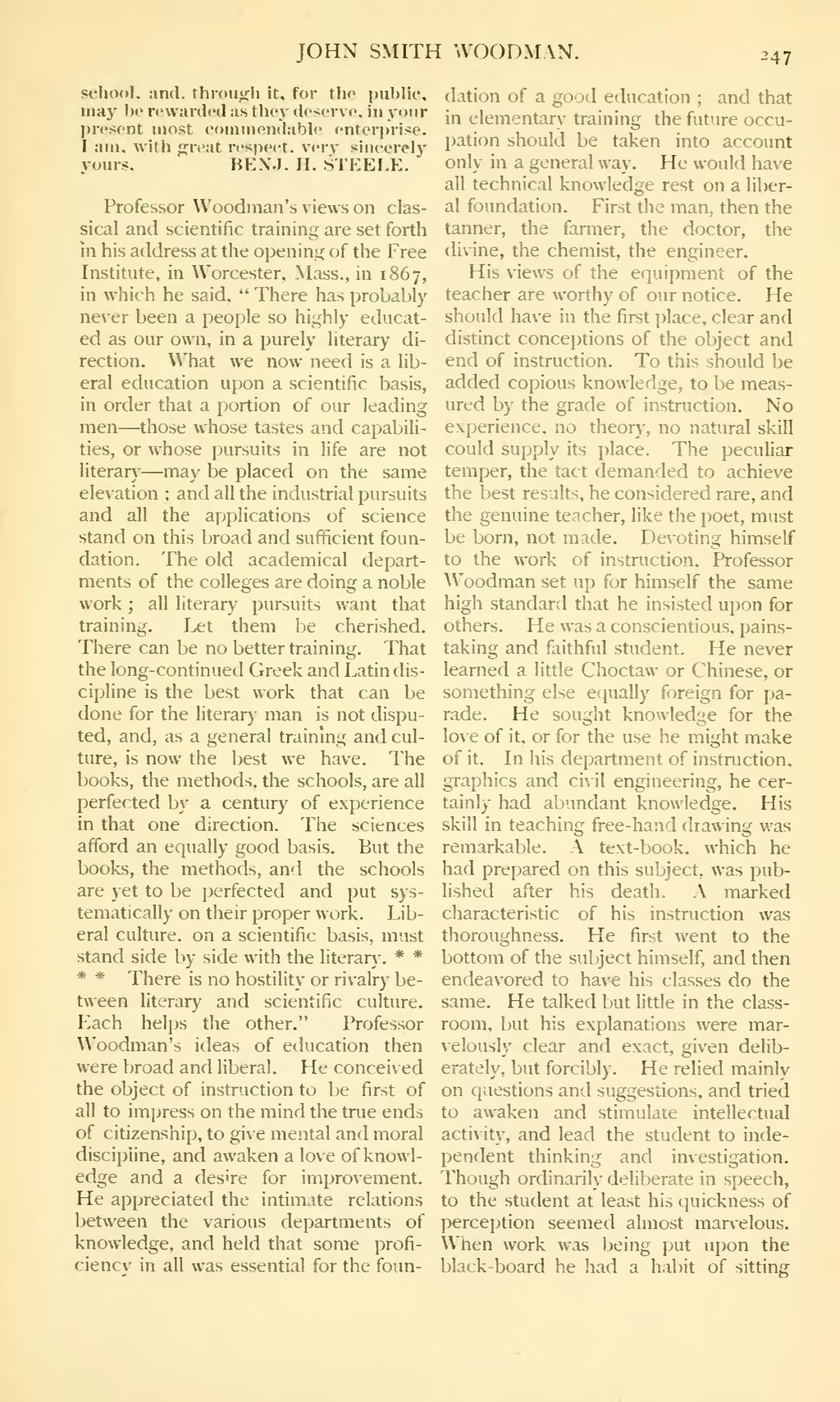school, and, through it, for the public, may be rewarded as they deserve, in your present most commendable enterprise. I am, with great respect, very sincerely yours. BENJ. H. STEELE.
Professor Woodman's views on classical and scientific training are set forth in his address at the opening of the Free Institute, in Worcester, Mass., in 1867, in which he said, "There has probably never been a people so highly educated as our own, in a purely literary direction. What we now need is a liberal education upon a scientific basis, in order that a portion of our leading men—those whose tastes and capabilities, or whose pursuits in life are not literary—may be placed on the same elevation; and all the industrial pursuits and all the applications of science stand on this broad and sufficient foundation. The old academical departments of the colleges are doing a noble work; all literary pursuits want that training. Let them be cherished. There can be no better training. That the long-continued Greek and Latin discipline is the best work that can be done for the literary man is not disputed, and, as a general training and culture, is now the best we have. The books, the methods, the schools, are all perfected by a century of experience in that one direction. The sciences afford an equally good basis. But the books, the methods, and the schools are yet to be perfected and put systematically on their proper work. Liberal culture, on a scientific basis, must stand side by side with the literary. * * * * There is no hostility or rivalry between literary and scientific culture. Each helps the other." Professor Woodman's ideas of education then were broad and liberal. He conceived the object of instruction to be first of all to impress on the mind the true ends of citizenship, to give mental and moral discipline, and awaken a love of knowledge and a desire for improvement. He appreciated the intimate relations between the various departments of knowledge, and held that some proficiency in all was essential for the foundation of a good education; and that in elementary training the future occupation should be taken into account only in a general way. He would have all technical knowledge rest on a liberal foundation. First the man, then the tanner, the farmer, the doctor, the divine, the chemist, the engineer.
His views of the equipment of the teacher are worthy of our notice. He should have in the first place, clear and distinct conceptions of the object and end of instruction. To this should be added copious knowledge, to be measured by the grade of instruction. No experience, no theory, no natural skill could supply its place. The peculiar temper, the tact demanded to achieve the best results, he considered rare, and the genuine teacher, like the poet, must be born, not made. Devoting himself to the work of instruction. Professor Woodman set up for himself the same high standard that he insisted upon for others. He was a conscientious, painstaking and faithful student. He never learned a little Choctaw or Chinese, or something else equally foreign for parade. He sought knowledge for the love of it, or for the use he might make of it. In his department of instruction, graphics and civil engineering, he certainly had abundant knowledge. His skill in teaching free-hand drawing was remarkable. A text-book, which he had prepared on this subject, was published after his death. A marked characteristic of his instruction was thoroughness. He first went to the bottom of the subject himself, and then endeavored to have his classes do the same. He talked but little in the classroom, but his explanations were marvelously clear and exact, given deliberately, but forcibly. He relied mainly on questions and suggestions, and tried to awaken and stimulate intellectual activity, and lead the student to independent thinking and investigation. Though ordinarily deliberate in speech, to the student at least his quickness of perception seemed almost marvelous. When work was being put upon the black-board he had a habit of sitting
